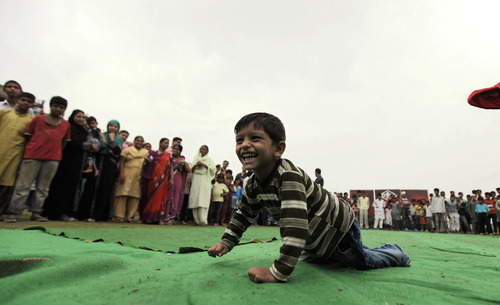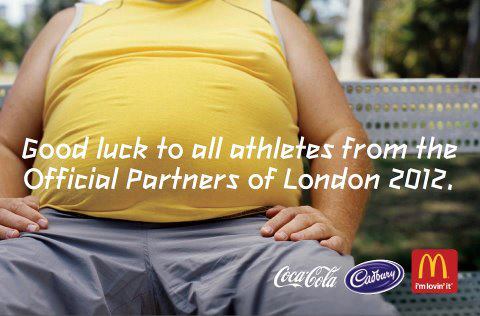Submitted by Will Dooling on
Global corporations like Dow Chemical, Adidas, and McDonald's are paying upwards of $100 million USD to sponsor the 2012 London games and associate themselves with the Olympic brand -- but with their brands already well-established, what do corporations get in exchange for these expensive sponsorship deals?
According to Dave Zirin, sportswriter and columnist for The Nation, the payoff comes through "corporate sin-washing."
"More than any other enterprise, if a company associates themselves with an Olympics, it really creates a positive feeling in the mind of the consumer," he says.
But, "if you look at the main sponsors that the International Olympic Committee has brought on board, you see companies like Dow Chemicals, British Petroleum, McDonald's, Adidas." These companies, Zirin tells the Center for Media and Democracy, are some of "the worst corporate criminals" most in the need of an Olympic absolution.
"Official Chemical Company" of Olympics Refusing Bhopal Responsibility
 Dow Chemical, the "Official Chemical Company" of the Olympics, is "really despised among large swaths of the community in the UK, because of Bhopal," Zirin said.
Dow Chemical, the "Official Chemical Company" of the Olympics, is "really despised among large swaths of the community in the UK, because of Bhopal," Zirin said.
The Bhopal disaster, the most deadly industrial accident in history, involved a 1984 leak of methyl isocyante gas from a Union Carbide pesticide plant in Bhopal, India that reportedly killed between 4,000 and 8,000 people and injured hundreds of thousands of others. The total number of deaths from ongoing contamination is now estimated at 25,000.
Although Union Carbide settled with the Indian Government for $470 million in 1989 (with victims receiving $1,500 per death and $500 per injury), critics allege that some 425 tons of hazardous waste remain on the grounds of the old factory and continue to poison groundwater. Dow Chemicals has since acquired Union Carbide's assets but has refused to accept responsibility for its liabilities. Since late 2010, the Indian government has attempted to increase the compensation paid by Union Carbide to $1.1 billion), but Dow claims that it holds no liability or responsibility for Bhopal, and will not pay to compensate victims or clean up the still contaminated disaster site. Some have noted that the many millions Dow has spent on its Olympic games sponsorship might be better used helping victims of the Bhopal disaster.
Dow's most visible contribution to the 2012 games is the creation of a massive decorative sheath that rings the Olympic stadium. But late last year, Dow agreed to remove their logo from the sheath after protest from the Indian Olympic Association's Executive Board, which has vigorously opposed Dow's sponsorship of the Olympic games.
Protestors in India have also raised awareness of Dow's footprint in their country. In February, protestors in New Delhi staged a mock funeral for the victims of Bhopal outside the office of the Indian Sports Minister. In a more recent protest, the day before the opening ceremony in London, thousands of Bhopal citizens held a "special Olympics" near the site of the disaster, starring over 100 children with physical or mental birth defects attributed to the disaster. The Bhopal Olympics featured football, an assisted walk, and a "crab walk" event for participants who were unable to walk on both legs.
"This was a company that needed the cleansing, and they are paying for it," Zirin said. Dow reportedly paid over $100 million to sponsor the games.
McDonald's, Cadbury, and Coke Push Junk Food on Tourists, Athletes
One of the most visible sponsors of this year's Olympics is McDonald's, whose processed fatty foods would appear to be at odds with the athletic perfection on display at the games. Also sponsoring the games are junk food manufacturers Coca-Cola and Cadbury.
 McDonald's has used the Olympics to rebrand itself as a purveyor of healthy foods, in addition to Big Macs and French fries. Its booth at the Olympics offers veggie wraps and it has been running ads touting its under-400 calorie menu options. Additionally, in Britain in the months before the games, the fast-food chain gave away sports equipment like pedometers in its Happy Meals, which the U.K.-based Children's Food Campaign described as a "cynical" effort to emphasize the connection between exercise and health, while "seeking to downplay the role diet has in combating obesity."
McDonald's has used the Olympics to rebrand itself as a purveyor of healthy foods, in addition to Big Macs and French fries. Its booth at the Olympics offers veggie wraps and it has been running ads touting its under-400 calorie menu options. Additionally, in Britain in the months before the games, the fast-food chain gave away sports equipment like pedometers in its Happy Meals, which the U.K.-based Children's Food Campaign described as a "cynical" effort to emphasize the connection between exercise and health, while "seeking to downplay the role diet has in combating obesity."
McDonald's sponsorship has also drawn criticism from many of Britain's leading medical organizations, including the Academy of Royal Medical Colleges, as well as the City Assembly of London, which in June passed a (largely symbolic) resolution that the games exclude sponsors that promote products connected to childhood obesity.
The 3,000 square foot McDonald's restaurant in the center of Olympic park is the largest in the world (and will be bulldozed after the paralympics closing ceremony -- which also seems at odds with the Olympic commitment to sustainability).
BP and "Sustainable Mobility Options"
The official website of the Olympics insists that "sustainability is at the heart of the games," which seems at odds with corporate sponsor British Petroleum, or BP. But the purveyor of non-renewable energy sources is doing its best to change that image. "Switching its slogan to 'beyond petroleum' didn't work," Zirin notes, so BP is "seeking something to burnish its own reputation" in the wake of the massive Gulf oil spill and other bad publicity.
BP intends to use the games to promote "the potential of new and more sustainable mobility options," according to their sponsorship page. The British oil company boasts that it invests about $1 billion dollars annually in alternative energy like biofuels and wind, but this is less than 1 percent of its operating budget. By comparison, it has spent upwards of $38 billion on the 2010 Deepwater Horizon spill, a fraction of the disaster's full cost, which it still refuses to shoulder.
BP's Olympian plan to improve their image may be working. Before the games began, "sponsorship specialist" Havas Sports & Entertainment released a report suggesting that those who knew BP was sponsoring the Olympics were more likely to believe that BP "was working towards a cleaner planet."
But even after Deepwater Horizon, BP has continued to invest heavily in United States lobbying for increased offshore drilling, and continues to fund organizations that promote climate change denial and environmental deregulation, such as the American Legislative Exchange Council (ALEC).
Adidas Footwear Gets a New Price Tag
The London Organizing Committee for the 2012 Olympic games insists that all sponsors pay their workers a "sustainable" living wage. But official Olympics sportswear sponsor Adidas does not do the same for its employees.
Starting about two weeks before the opening ceremonies of the 2012 Olympics, War On Want, an international antipoverty organization, began distributing leaflets in London. The leaflets came in the shape of price tags, and carried instructions to stick the tags to Adidas products in local stores. Each leaflet was labeled "34p," a wage War on Want charges is "the minimal hourly wage rate for Indonesian workers making the brand's goods," as revealed in an investigation by British newspaper The Independent in April of this year. 34 pence is about 50 cents.
Adidas insists that their wage rate in Indonesia is "almost double" the rate reported by The Independent and protested by the War on Want. Adidas has seen profits soar recently, which some attribute to it spending over $100 million sponsoring the games.
Olympic Committee Bends to Corporate Sponsors
The London Olympic organizing committee has justified tough branding restrictions on non-Olympic sponsors by noting its dependence on corporate sponsors, and claiming that over two-thirds of its operating budget is raised from corporate sponsors. But Zirin estimates that corporate sponsorship actually makes up "about two percent of the total cost" of putting on the games. "It was a much higher percentage when the London Olympic organizers were telling people it would be a $3.5 billion Olympics. [But] now that the number is closer to $20 billion, the public is the one taking up the rest of that slack."
However, "the corporations that underwrite the games ... have proven to be very resilient to having any accountability for cost overruns or security for the games," he said. "The overruns, [organizers] deal with through deficit spending," he said, through "raising taxes after the Olympics and other financial sleights-of-hand. [And] that usually ends up on the backs of the 99%."
Still, Zirin says that the games are nonetheless "extremely dependent on corporate sponsorship. It's how you get the horse out of the barn."
And the corporate sponsors still are granted exclusive rights favorable to their interests. For example, London's Olympics chief said in a radio interview that ticket-holders wearing a Pepsi T-shirt would probably be refused admission, "because Coca-Cola are our sponsors and they have put millions of pounds into this project but also millions of pounds into grassroots sport." Coca-Cola also has a monopoly on selling soft drinks in the stadium, and fellow sponsor McDonald's holds the exclusive right to sell French fries at the Olympic games (with a special exception for selling fries with chips in recognition of Britain's cultural attachment to "fish and chips.")
Zirin's favorite example of odd, corporate-friendly Olympic rules involves Australian boxer Daniel Hooper, who wore a T-shirt with an Australian Aboriginal flag in a recent boxing match to showcase his Aboriginal roots. Hooper could face disciplinary action for making a "political statement" by wearing the shirt, which contains a flag not recognized by the International Olympic Committee (IOC). The flag is, however, recognized by the Australian government as an official flag of Australia.
"What's particularly perverse about this is that if Damien Hooper had chosen a shirt that said 'I love British Petroleum' or 'Dow Chemicals is A-OK with me', he would have been allowed to compete." Zirin observes "it's amazing to me that wearing a shirt that says 'Dow Chemicals' is not seen as a political statement, while wearing a recognized flag of your own country is a political statement, because the IOC chooses not to recognize that flag."

Comments
Anonymous replied on Permalink
Welcome to capitalism
Anonymous replied on Permalink
This attitude is why positive changes don't occur often.
Mary Whitmore replied on Permalink
attitude and positive change
Rashaad Prins replied on Permalink
Immigration
Anonymous replied on Permalink
What a sadly sophomoric view...
Eddie Cochran replied on Permalink
Sponsors